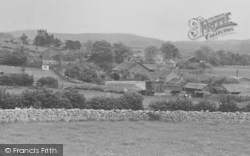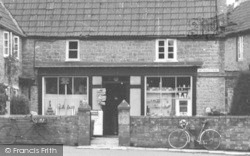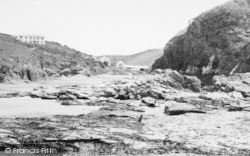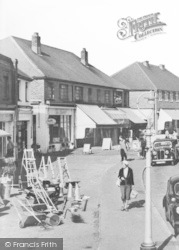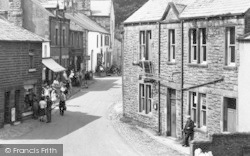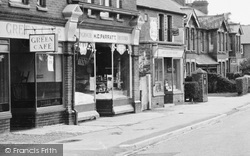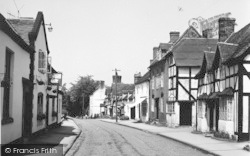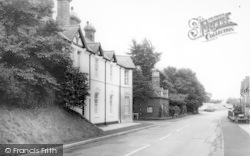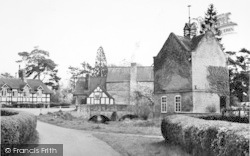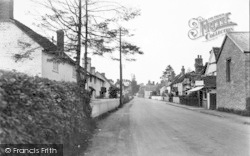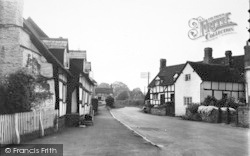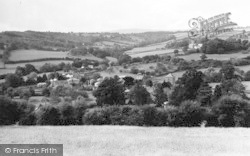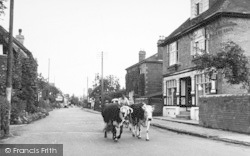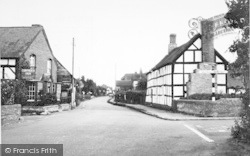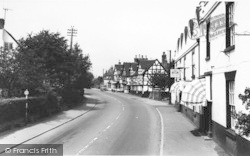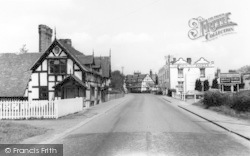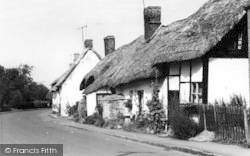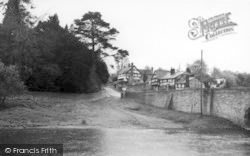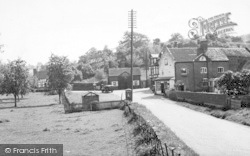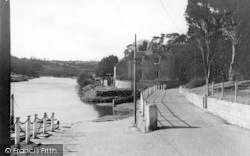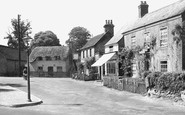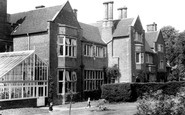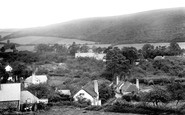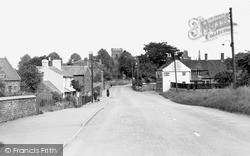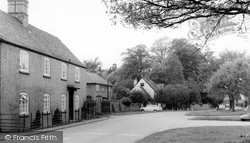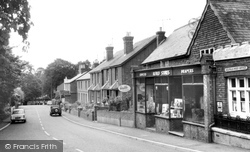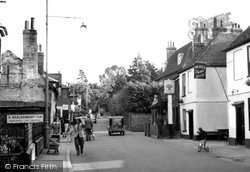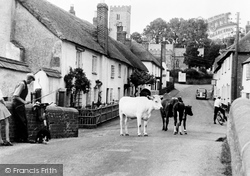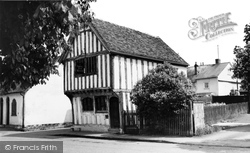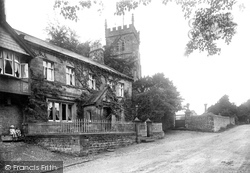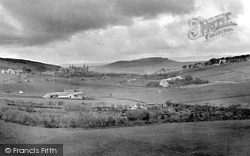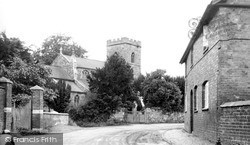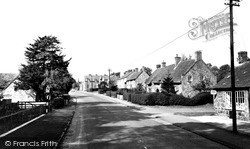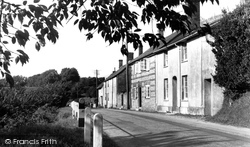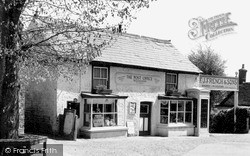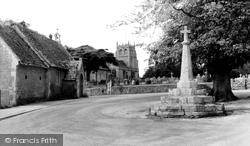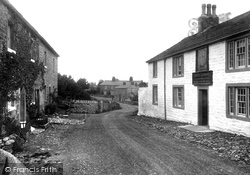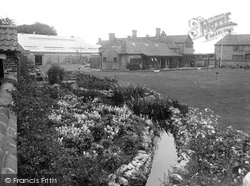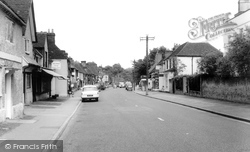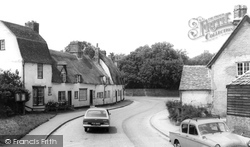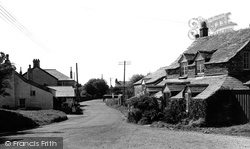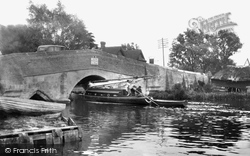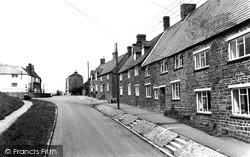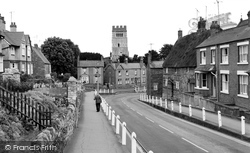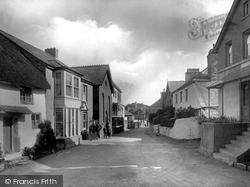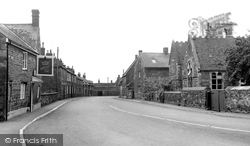Places
5 places found.
Those places high-lighted have photos. All locations may have maps, books and memories.
Photos
9,649 photos found. Showing results 2,081 to 2,100.
Maps
18 maps found.
Books
13 books found. Showing results 2,497 to 13.
Memories
4,612 memories found. Showing results 1,041 to 1,050.
The People Of Kilfinan
The year my mum and dad got married in Kilfinan Church. My mum was born and brought up in Kilfinan Post Office where my granny, Mrs Maclachlan was the post mistress for many of my childhood years. I don't actually remember the ...Read more
A memory of Kilfinan in 1951 by
The Local Bobby
In 1932 my father Len James was moved to Brockenhurst as the 'village bobby'. I was born in 1931 and my brother in 1929. We lived in the Police house (now a renovated private home) and eventually both us boys went to the C of E ...Read more
A memory of Brockenhurst in 1930 by
Broughton Astley Pre 1950
This is my second entry about Broughton Astley and may contain some references to items in my first reminisces. As a person 'born and bred' in Broughton Astley, I have fond memories of the village as it was 'in the ...Read more
A memory of Broughton Astley by
Great Times
We used to live in Yeadon in a council house, and when my Dad came out of the Army as an Officer he bought a plot in Hawksworth Lane (number 54). He had a house built by Prior who built all the Tranmere Park Estate ...Read more
A memory of Hawksworth in 1953 by
Peter Marshall 58 To 65
I'm as sure as I can be, that the little boy in the picture with the black coat is me. I would have been three to four years old (depending what time of year the picture was taken). I was the youngest at the home at that ...Read more
A memory of Glenfield in 1960 by
Troedrhiwfuwch Village Life
There are a few more observations I wish to make about Troedy. There is a common theme running through most of the memories posted on this website and that is one of very happy times gone by. As an outsider, I ...Read more
A memory of Troedrhiwfuwch by
Years Gone By From 1944 To Present Time
Hi, my name is Dot Dunn (nee Harmer). I've lived in Station Town and Wingate all my life and wouldn't want to live anywhere else and am still in contact with a lot of my school friends. I can still name all ...Read more
A memory of Wingate in 1950 by
Wonderful Childhood
I spent a wonderful childhood in Norton Fitzwarren when it was a village from 1950 to 1958. I have priceless memories of roaming the fields, woodlands and surrounding countryside freely. Of sitting on top of Moses Park ...Read more
A memory of Norton Fitzwarren in 1950 by
Ww2 In Bratton
As a child living in Bratton during the war there was no sense that it was going on lucky for us, but I do remember a goup of people coming into the village and instructing us how to take care of any injuries that might happen. They ...Read more
A memory of Bratton in 1943 by
Clarks Of Droxford
I can only say my late father was the grocer in the village - Rodney Clark. I was born in Manor Cottage. Dad died when I was only four years of age. My memories are of the shop in Park Lane, I would go with my mother's uncle, Pat ...Read more
A memory of Droxford in 1959 by
Captions
5,016 captions found. Showing results 2,497 to 2,520.
This view has changed a lot since 1950 due to the increase in traffic. The Old Red Lion on the right survives but is renamed The Monk and Minstrel.
This is an oasis between industrial Syston and unlovely Sileby, where, apart from an increase in traffic, the scene has changed little.
East of Chiddingfold the lanes wind to Alfold, which lies close to the Sussex border.
The High Street runs from the parish church, with its white-painted weatherboarded tower, to the Guildford road in the distance.
It is still not unusual to see a scene such as this in East Budleigh, for the farms in the vicinity are very active.
Truly one of the finest small museums in Hertfordshire, Ashwell Village Museum was founded in November 1930 and is based on the collection of Albert Sheldrick and John Bray, made when they were schoolboys
This is a charming photograph of the area outside the churchyard entrance. Many refer to this village as the most perfect in Lancashire, with its village green next to the church, and old inn.
The village used to be called Auldkirk, because the people of Greenock worshipped here until they built their own church at the end of the 16th century.
Situated on the south-west side of the village, the church was heavily restored by Frederick Peck of Maidstone in 1872.
Ribbon development of local stone houses under thatched and slated roofs, while not overheating the blood, do present a well-ordered scene; their dates range from the pre-17th century to modern, close
We are looking south-eastwards from the Yetminster road towards the mediaeval Hamstone cross in a triangle of cobbles (centre), with roads at the junction signed to Sherborne (left) and Chetnole (right
We are on the slope of the Downs between Eastbourne and Polegate. A nearby vantage point at Combe hill is 638 feet high.
The parish church of St Martin is described as 'Anglo-Saxon origins, c1200, C13, C15, restored 1850' (Department of Heritage List). The former school, now the village hall, is dated 1846.
West Bradford gets its name from being west of the broad, shallow ford of the River Ribble.
The inn was built in 1927 using traditional materials, especially local flint; its design makes it look much older then it really is.
With its pollarded lime trees and some charming half-timbered cottages spread along its length, the village High Street suffered for several decades from the heavy traffic which thundered along this stretch
Edward Wright, the village baker, gave his name to this row of cottages in the High Street. His house and the bakery, second from left, are thought to be more than 300 years old.
Tintagel is a 'must' on every tourist's itinerary, and the main street is full of hotels, guest houses and souvenir shops, many developed since writers such as Tennyson romanticised the legend of King
The old medieval stone bridge, with one central and two pointed side arches, carries Yarmouth-bound traffic over the Thurne. Its painted warning 'Caution, proceed slowly' must not be ignored.
Before the dawn of the railway era, Woodford Halse was a sleepy community untouched by time.
Called Earls Barton because of its connections with the earls of Northampton, it is mainly noted for its powerful Anglo-Saxon church tower, seen here dominating the view.
Strete stands on the winding lanes which form the highway between Dartmouth and the villages clustered around the great freshwater lake of Slapton Ley.
The old medieval stone bridge, with one central and two pointed side arches, carries Yarmouth-bound traffic over the Thurne. Its painted warning 'Caution, proceed slowly' must not be ignored.
The White Hart and Foresters Cottages are on the left. John Bradley was once the landlord, also an undertaker who made his own coffins.
Places (5)
Photos (9649)
Memories (4612)
Books (13)
Maps (18)




